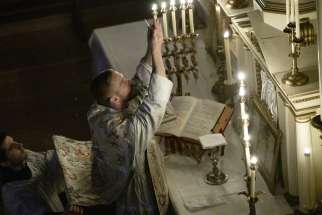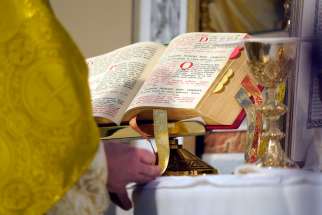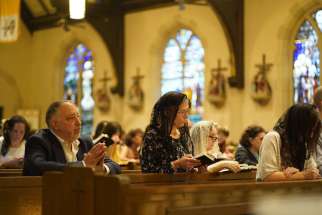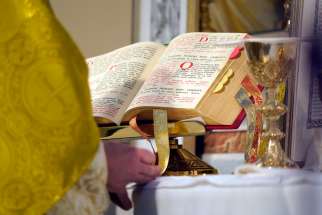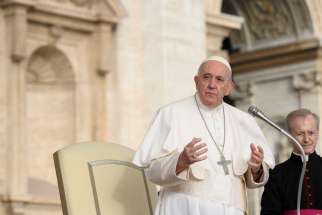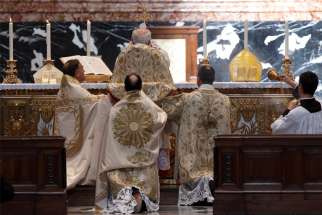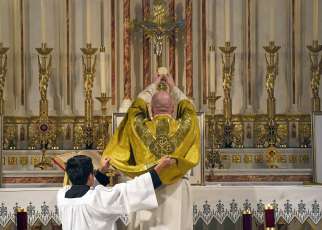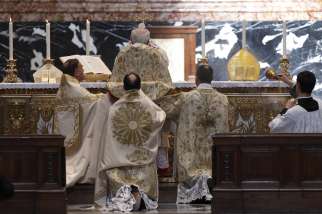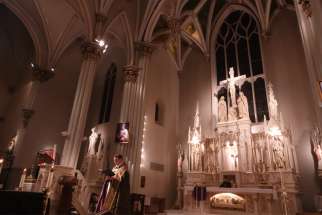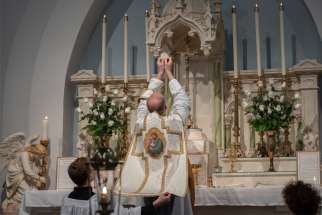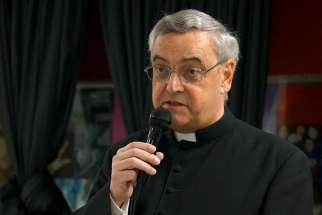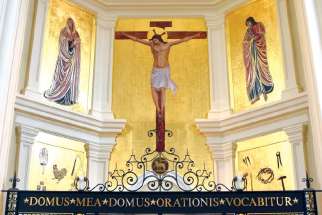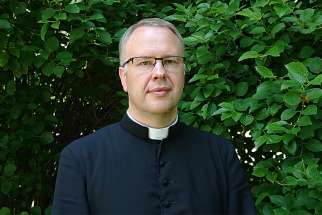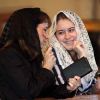‘Let the skies pour down righteousness’
Vatican announces visitation of Priestly Fraternity of St. Peter
The Vatican dicastery charged with overseeing and assisting religious orders confirmed that it plans to conduct an apostolic visitation of the Priestly Fraternity of St. Peter, which was founded in 1988 by traditionalist priests wanting to maintain the old liturgical rites while remaining in full communion with the pope.
Like British peers, prominent US figures ask pope not to further restrict traditional Mass
Following the example of a group of British cultural icons, a group of American "Catholics and non-Catholics" and prominent cultural and intellectual personalities asked Pope Francis in an open letter July 15 not to further restrict the traditional Latin Mass.
Pope Francis clarifies rules limiting celebration of Tridentine Mass
Diocesan bishops must have Vatican authorization to allow the celebration of the pre-Vatican II Mass in a parish church, to establish a new "personal parish" for devotees of the old Mass or to allow its celebration by a priest ordained after July 2021 when Pope Francis issued rules restricting the celebration, he said.
Starting to feel Francis is including me out
My inclination is to defend whoever is our pope. I say this for several reasons. For one a pope is Christ’s shadow on Earth. I also believe popes are chosen by men influenced by the Holy Spirit. Lastly, I’m a convert. The idea of criticizing a pope seems presumptuous for someone relatively new to the faith.
Dioceses review Latin Mass restrictions
A week after Pope Francis re-imposed restrictions on pre-Vatican II Latin Mass, parishioners at Holy Family Catholic Church in Toronto were still praying with the 1962 Missale Romanum at their regular 11:30 weekday Masses.
Charles Lewis: Pope sends discouraging message
Pope Francis has sent a message to those who attend the Latin Mass. In essence he has said: We do not really want you. It is time you went away. It is time to give up your “divisive” ways.
VATICAN CITY — Saying he was acting for the good of the unity of the Catholic Church, Pope Francis has restored limits on the celebration of the Mass according to the Roman Missal in use before the Second Vatican Council, overturning or severely restricting permissions St. John Paul II and Pope Benedict XVI had given to celebrate the so-called Tridentine-rite Mass.
Latin Mass celebrated for famed Memphis Catholic who founded order
MEMPHIS, Tenn. -- On the night of a full moon Sept. 13, a high Mass in Latin was celebrated in remembrance of prominent Memphis historical figure Mother Mary Agnes Magevney (1841-1891) at St. Peter Church, sponsored by the Magevney Society.
ROME -- The grand master of the Sovereign Order of Malta has reminded members that all liturgical celebrations within the order must be celebrated according to the ordinary form of the Roman rite, not the extraordinary form, known as the Tridentine rite.
OTTAWA – An order of priests that became “like orphans” 30 years ago when it broke away from the schismatic Society of St. Pius X has prospered by observing Church tradition and stressing unity with the Holy Father.
Fr. Raymond J. De Souza: Church offers fresh devotion through art and the Passion
I am looking forward to my next visit to Holy Family Church on King Street West in Toronto. It was my home for two years in the 1990s when I was a student at St. Philip’s Seminary, which is attached to the parish.
Old-fashioned worship attracts youth
Ottawa - The pre-Vatican days of Latin-language Masses are on the rise among Catholic youth.
In Ottawa, St. Clement’s parish moved its daily traditional Latin Mass to St. Anne’s Church in Lowertown to accommodate its growing congregation, including many young families.
Michael and Rebecca Trolley, a couple in their 20s, are very active at Annunciation Anglican Use Catholic Church. “Anglican Use” refers to a particular form, or “use,” of the Roman rite (or Mass) which draws heavily upon the Anglican liturgical and musical tradition, incorporated into a Catholic context.
“We were both nerdy bookworms,” said Michael, who is very interested in Church history. “For a lot of young people, I think there’s a deep skepticism about contemporary culture. And if they want to do something spiritual, the last thing they want is something that looks like everything that’s going on around them. If they’re going to do something different, they’re going to do something really different.”
Prior to 1970, the Roman Mass was celebrated in Latin; this older form of the Mass is now commonly referred to as the traditional Latin Mass. After the Second Vatican Council, the Mass was translated into many different languages, including English. Some communities such as St. Clement’s, however, still celebrate the traditional Latin Mass.
The Trolleys note the similarities between their traditional Anglican Use liturgy and the older form of the Roman rite.
“The differences aren’t so much the text of the liturgy,” said Michael. “In the way that they’re celebrated, our Mass has a great deal in common with the Extraordinary Form (the traditional Latin Mass). They’re both celebrated facing east, it’s usually chanted, with incense. It’s quieter in some ways, it’s more formal, a greater spirit of reverence.”
Rebecca disagrees: “I wouldn’t say it’s more quiet, especially when we do a High Mass. It’s very noisy, because we’re singing a lot. Music is more a part of our tradition. Anglicans like to sing, Catholics don’t,” she jokes, referring to the tradition from which their liturgy derives.
Many young Catholic Canadians do not know much about traditional forms of worship, what a traditional liturgy consists of and how it differs from what is seen in a regular Catholic parish.
“We’ve actually tried to bring back some of what were originally monastic practices into the life of a parish,” said Subdeacon Andrew Bennett, a regular worshipper at Ottawa’s Holy Cross Ukrainian Catholic Chaplaincy.
“The vast majority of people at the chaplaincy are students,” said Bennett. “In a culture that often lacks an understanding of what mystery is, an understanding of how we as human beings need liturgical worship to enter into the mystery of God present in His Church, I think young people crave authenticity. And in the Christian tradition, if they see authenticity, they’re drawn to it.”
“Monastic practices” refer to the services regularly observed in monasteries. Thus, worshippers at the chaplaincy sing Matins (a service of morning prayer) before the Divine Liturgy (the term for the Mass in the Eastern churches) every Sunday morning.
“A Roman Catholic coming in off the street would notice first of all that it’s longer and that we sing everything,” Bennett said.
Everything in the Divine Liturgy (except the homily) is chanted in the Byzantine rite, a collection of Eastern churches which have come into union with the Roman Catholic Church. But according to the subdeacon, this custom is not exclusive to Byzantine Catholics such as those who attend the chaplaincy.
“The Roman rite has this tradition as well, but in most parishes since the Second Vatican Council, this tradition of the sung Mass has been lost,” said Bennett. “But now you’re seeing again a return to some of these traditions in the Roman Catholic Church.”
(Candy, 21, is a third-year English student at the University of Ottawa.)


